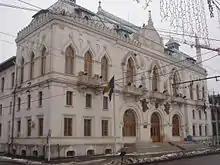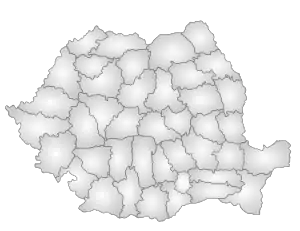Galați County
Galați (Romanian pronunciation: [ɡaˈlat͡sʲ] (![]() listen)) is a county (județ) of Romania, in Moldavia region, with the capital city at Galați.
listen)) is a county (județ) of Romania, in Moldavia region, with the capital city at Galați.
Galați County
Județul Galați | |
|---|---|
County | |
 Coat of arms | |
 | |
| Coordinates: 45.79°N 27.78°E | |
| Country | |
| Development region1 | Sud-Est |
| Historic region | Moldavia |
| Capital city (Reședință de județ) | Galați |
| Government | |
| • Type | County Board |
| • President of the County Board | Costel Fotea |
| • Prefect2 | Gabriel-Ioan Avrămescu |
| Area | |
| • Total | 4,466 km2 (1,724 sq mi) |
| Area rank | 34th in Romania |
| Population (2011 census[1]) | |
| • Total | 536,167 |
| • Rank | 14th in Romania |
| • Density | 120/km2 (300/sq mi) |
| Time zone | UTC+2 (EET) |
| • Summer (DST) | UTC+3 (EEST) |
| Postal Code | 80wxyz3 |
| Area code(s) | +40 x364 |
| ISO 3166 code | RO-GL |
| Car Plates | GL5 |
| GDP | US$ 3.15 billion (2015) |
| GDP per capita | US$ 5,874 (2015) |
| Website | County Board County Prefecture |
| 1The developing regions of Romania have no administrative role. They were formed just to attract funds from the European Union 2 as of 2007, the Prefect is not a politician, but a public functionary. He (or she) is not allowed to be a member of a political party, and is banned to have any political activity in the first six months after the resignation (or exclusion) from the public functionary corps 3w, x, y, and z are digits that indicate the city, the street, part of the street, or even the building of the address 4x is a digit indicating the operator: 2 for the former national operator, Romtelecom, and 3 for the other ground telephone networks 5used on both the plates of the vehicles that operate only in the county limits (like utility vehicles, ATVs, etc.), and the ones used outside the county | |
History
Historically Galați is part of Moldavia. In 1858, it was represented by Alexandru Ioan Cuza at the ad hoc Divan at Iași, in the wake of the Crimean War. Prior to 1938 what is now eastern Galați was the separate Covurlui County (Județul Covurlui). From 1938 to 1945 Galați was part of Ținutul Dunării (Megacounty Dunării).
2010 Romanian floods
During July 2010, the River Siret threatened to break through the dykes protecting the town of Șendreni, as locals and emergency services reinforced the dykes with sandbags trucks full of earth to prevent the river breaking out and flooding the town.[2]
Demographics
In 2011, it had a population of 536,167 and the population density was 120/km2.
- Romanians – over 98%[3]
- Russians, Ukrainians and Romani.
| Year | County population[1][4] |
|---|---|
| 1948 | 341,797 |
| 1956 | |
| 1966 | |
| 1977 | |
| 1992 | |
| 2002 | |
| 2011 |
Geography
This county has a total area of 4,466 km2.
The county lies on a low plain, between the Prut River in the East, the Siret River in the West and South-West. They both flow into the Danube which forms the border with Tulcea County in the South-East.
Neighbours
- Republic of Moldova in the East – Cahul raion.
- Vrancea County in the West.
- Vaslui County in the North.
- Brăila County and Tulcea County in the South.
Economy
Due to the relief, the majority of the population in the rural areas work in agriculture. Fishing is another profitable occupation along the Danube and the Siret River. Galați is Romania's second harbour after Constanța, the navigable channel on the Danube allowing the passage of large ships. In Galați there exist the biggest metallurgical complex in Romania – the Mittal-Sidex Complex. Also the second biggest shipyard can be found also at Galați allowing ships up to 55,000 tdw to be built.
The predominant industries in the county are:
- Metallurgy – 55% of Romania's steel production.
- Food industry.
- Textile industry.
- Ship building industry.
The county of Galați is also an important transport hub.
Politics
The Galați County Council, elected at the 2016 local government elections, is made up of 35 counselors, with the following party composition:
| Party | Seats | Current County Council | |||||||||||||||
|---|---|---|---|---|---|---|---|---|---|---|---|---|---|---|---|---|---|
| Social Democratic Party | 15 | ||||||||||||||||
| National Liberal Party | 9 | ||||||||||||||||
| People's Movement Party | 6 | ||||||||||||||||
| Alliance of Liberals and Democrats | 4 | ||||||||||||||||
| Independent | 1 | ||||||||||||||||
Administrative divisions

Galați County has 2 municipalities, 2 towns and 61 communes
- Municipalities
- Towns
- Communes
- Bălăbănești
- Bălășești
- Băleni
- Băneasa
- Barcea
- Berești-Meria
- Brăhășești
- Braniștea
- Buciumeni
- Cavadinești
- Cerțești
- Corni
- Corod
- Cosmești
- Costache Negri
- Cuca
- Cudalbi
- Cuza Vodă
- Drăgănești
- Drăgușeni
- Fârțănești
- Foltești
- Frumușița
- Fundeni
- Ghidigeni
- Gohor
- Grivița
- Independența
- Ivești
- Jorăști
- Liești
- Măstăcani
- Matca
- Movileni
- Munteni
- Nămoloasa
- Negrilești
- Nicorești
- Oancea
- Pechea
- Piscu
- Poiana
- Priponești
- Rădești
- Rediu
- Scânteiești
- Schela
- Șendreni
- Slobozia Conachi
- Smârdan
- Smulți
- Suceveni
- Suhurlui
- Țepu
- Tudor Vladimirescu
- Tulucești
- Umbrărești
- Valea Mărului
- Vânători
- Vârlezi
- Vlădești
References
| Wikimedia Commons has media related to Galați County. |
- "Population at 20 October 2011" (in Romanian). INSSE. 5 July 2013. Retrieved 9 July 2013.
- "Archived copy". Archived from the original on 3 July 2010. Retrieved 2010-07-11.CS1 maint: archived copy as title (link)
- National Institute of Statistics, "Populația după etnie" Archived 16 August 2009 at the Wayback Machine
- National Institute of Statistics, "Populația la recensămintele din anii 1948, 1956, 1966, 1977, 1992 și 2002" Archived 22 September 2006 at the Wayback Machine
External links
- "Consiliul Județului Galați" County administration webpage in Romanian
- "Galați Online" Viitorul portal gălățean
